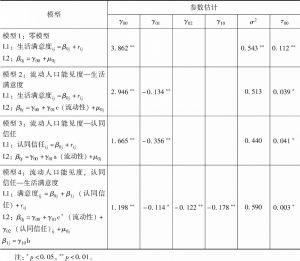论文
人口流动、信任与生活满意度:一个跨层次中介模型
摘要
居住地的变化与个体生活满意度的关系受到各界学者的广泛关注。本研究以中国综合社会调查(CGSS)数据为基础,采用跨层次分析方法,从人口流动率的角度,探讨人口流动与生活满意度的关系,进一步分析信任在二者之间的中介机制。研究发现,28个省(自治区、直辖市)居民的生活满意度水平差异显著,流动人口能见度对生活满意度具有显著的负向预测作用。同时研究还表明,认同信任在流动人口能见度(二层变量)与生活满意度之间起中介作用,但是流动人口能见度对个体的一般信任水平没有影响。本研究结果不仅可以帮助我们更好地理解居住流动与生活满意度的关系和机制,而且有利于我们更好地把握和应对居住流动对个体的消极影响。
作者
赵娜 ,中央财经大学社会与心理学院心理学系副教授,硕士生导师。
张莹 ,中央财经大学社会与心理学院心理学系讲师。
Zhao Na
Zhang Ying
检索正文关键字
论文目录
-
一 引言
- (一)居住流动性
- (二)居住流动和生活满意度
- (三)认同信任的中介作用
- (四)研究框架
-
二 方法
- (一)被试
- (二)变量
- 1.流动人口能见度(二层变量)
- 2.信任
- 3.生活满意度
- (三)数据分析方法
-
三 结果
- (一)描述性因素分析
- (二)流动人口能见度与生活满意度的关系:信任的跨层次中介作用
-
四 讨论
- (一)跨层次分析的必要性
- (二)居住流动性与生活满意度
- (三)两种信任类型及作用
相关文献
查看更多>>>






